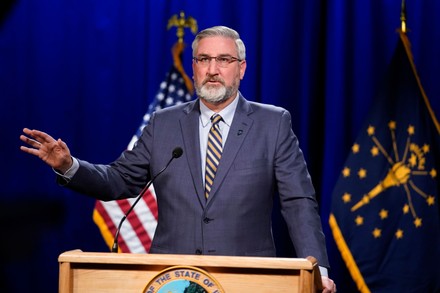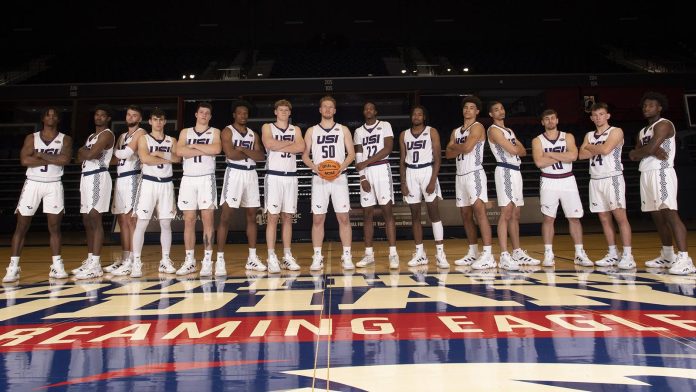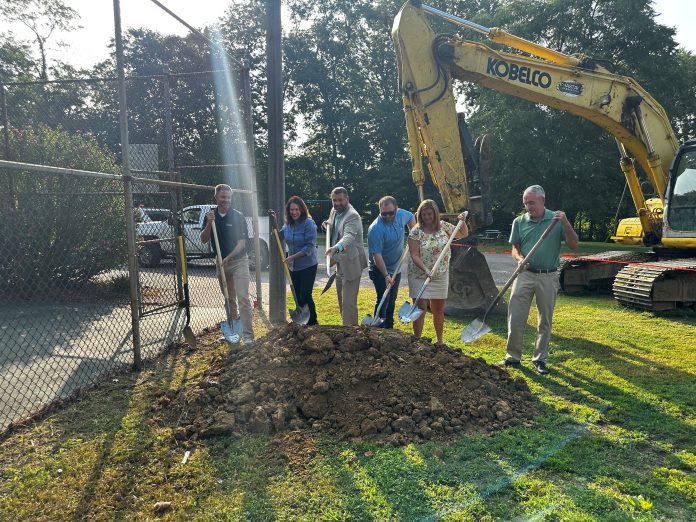VINCENNES, Ind. – The Vincennes University volleyball team got the 2023 season started off with a bang, defeating Region 24 opponent Shawnee Community College in three sets 25-15, 25-8, 25-7 Tuesday night.
VU got off to an excellent start in front of the home crowd, scoring 10 of the first 12 points of the opening set, before the Saints would battle back and capitalize off some Vincennes errors to cut the deficit to 14-10.
The Blazers would rebound and close out the set with four unanswered points to take the first set of the season 25-15 over Shawnee.
Vincennes again got off to a great start in set two, jumping out to an early 10-3 lead, before trading points with the Saints to make the score 12-6.
The Trailblazers then took their game up another level, closing out the second set by outscoring the Saints 13-2 and taking set two 25-8 and a 2-0 match lead.
VU carried this momentum into the third set, with sophomore Maecy Johnson (Chrisman, Ill.) leading off the set and serving on nine straight points.
After back-to-back Shawnee points, the serving then turned to freshman Grace Flexter (Oblong, Ill.) who would go on an 8-0 scoring run of her own as VU built a commanding 17-2 advantage in the third set.
Shawnee would not go away quietly however, continuing to battle late, but were unable to overcome the massive deficit as VU took set three and completed the sweep over the Saints 25-7.
“I’m not entirely sure we can just call them ‘freshman mistakes’ in that first set,†VUVB Head Coach Gary Sien said. “Some of our veterans made some mistakes there early on as well. In our last scrimmage against Kentucky Wesleyan, we really played at a high level. It’s obviously a different level coming in here and playing Shawnee, so we probably came in with a mindset that we won’t typically have because we always have a really tough schedule.â€
“But, regardless of that, we still have to play at a high level,†Sien added. “It was the first real game over here and we have eight freshmen this year, so at least they were aggressive mistakes being made. It wasn’t like we were being hesitant and hitting the ball into the net, we were going for it. I’ll take aggressive mistakes any time.â€
“I really like how we came back in the second and third sets,†Sien said. “It was like we just took a deep breath and started playing like we have been all preseason. We executed really well tonight. We were very efficient with our hitting tonight. We had about eight hitting errors tonight, it seemed like seven of those were in the first set. But in the second and third sets I thought we really swung well.â€
“We gave up 15 points in the first set but came back and only gave up 15 points combined in the second and third sets,†Sien added. “So, we really took control of the game. We took control of every play and we were able to really execute our offense. I really liked how we were able to come back in the last two sets and really take control of the match.â€
The Trailblazers were led offensively by sophomore Paige Parlanti (Las Vegas, Nev.) who just missed on a double-double to open the season, finishing with a team-high 14 kills, nine digs, four aces, two blocks and two set assists.
Freshman Laura Tavares (Merida, Venezuela) did not disappoint in her VUVB debut, finishing with 12 kills, a team-high five blocks, including three solo blocks and one dig.
Sophomore Audrey Buis (Franklin, Ind.) finished her night with five kills, six digs and one block, while freshman Isadora Dias (Rio Grande de Norte, Brazil) ended with four kills and two blocks.
Freshman Allison Czyzewski (Louisville, Ill.) and sophomore Kennedy Sowell (Effingham, Ill.) each recorded three kills on the night, with Czyzewski finishing with four blocks, including two solo blocks and Sowell recording two blocks and one set assist.
Freshman Ellie Reed (Washington, Ind.) rounded out the VU offense Tuesday night, closing out the match with a kill to go along with one dig.
VU was very efficient offensively Tuesday night, recording a team hitting percentage of .457 and also controlled the net defensively very well, recording 16 total blocks as a team.
Sophomore Maecy Johnson ran the offense extremely well from the setter position, finishing with 26 set assists and two digs on the night.
Freshmen Dylan DeCoursey (Montgomery, Ind.) and Libby Mehringer (Jasper, Ind.) also had their turns at setter, with Mehringer recording three set assists, one dig and one ace, while DeCoursey finished with two set assists and two digs.
Sophomore libero Morgan Netcott (Montague, Mich.) controlled the back row defense well on her way to six digs and one set assist, before turning over libero duties to freshman Grace Flexter (Oblong, Ill.) for the third set. Flexter would end her night with three digs and two aces.
“Our middles with Kennedy and Allison, we definitely need to get them more sets, but they hit pretty efficiently tonight,†Sien said. “Our other hitters, Audrey and Isadora also hit at a high percentage as well. It seemed like everyone really swung well tonight, after the first set.â€
“The hitting efficiency though starts with having better ball control,†Sien added. “We were able to get a nice pass, so our setters could make good choices instead of getting sets from 10 to 15 feet out. We were really able to run our play sets out of that and when we are able to do that, it really puts our hitters into a nice position to hit the ball. Taking control of the game, really helped put our offense into great position to be so efficient.â€
The Trailblazers extended their winning streak over Region 24 opponents to 25 matches Tuesday night, a winning streak that dates back two seasons.
VU will put this winning streak on the line again Thursday, Aug. 24 when VU travels to nearby Robinson, Ill. to faceoff against Region 24 opponent Lincoln Trail College. This match is set to begin at 7 p.m. eastern.
“We need to be ready to get going right at the beginning Thursday,†Sien said. “In a way, if you have a slow start at home, it is more than likely you can recover from that. If you are behind in the first set on the road, it’s going to be hard to recover from. That’s what happened last year when we went there, they gave us everything we could handle and ended up winning the first set. So we do not want a repeat of that Thursday.â€
“They always play us hard,†Sien added. “Probably because they are so close by and they recruit some of our local kids. Another thing is that they are the new Division I program in Region 24 for volleyball, so they are going to go out there to prove that they belong.â€
“I always say that they are going to play at a high level, so we just have to go out there and match their level and match their intensity,†Sien said. “Typically, they will have a pretty big crowd. It’s an older gym where the sound just reverberates in there and it makes it sound like there’s 10 times the amount of people in there. We’ve got to be ready that if they make a play, we’re going to hear it, so we are going to have to play at a high level, so we don’t hear it.â€
“But this match Thursday should really let us know where we are at right now,†Sien added. “One nice thing about our preseason schedule is that we’ve already had two pretty tough road matches against Saint Mary of the Woods and Kentucky Wesleyan. Of course it’s different once it’s in a real game, but at least we’ve already experienced traveling a bit this season.â€
VINCENNES BOX SCORE
Shawnee – 15   8  7  x  x
VUVB (1-0, 1-0) – 25   25  25  x  x
INDIVIDUAL STATS
Grace Flexter – 2 points, 2 aces, 3 digs
Audrey Buis – 5.5 points, 5 kills, 1 block assist, 6 digs
Dylan DeCoursey – 2 digs, 2 set assists
Morgan Netcott – 6 digs, 1 set assist
Paige Parlanti – 19.5 points, 4 aces, 14 kills, 1 solo block, 1 block assist, 9 digs, 2 set assists
Isadora Dias – 5 points, 4 kills, 2 block assists
Allison Czyzewski – 6 points, 3 kills, 2 solo blocks, 2 block assists
Maecy Johnson – 2 digs, 26 set assists
Kennedy Sowell – 4 points, 3 kills, 2 block assists, 1 set assist
Laura Tavares – 16 points, 12 kills, 3 solo blocks, 2 block assists, 1 dig
Libby Mehringer – 1 point, 1 ace, 1 dig, 3 set assists
Ellie Reed – 1 point, 1 kill, 1 dig









